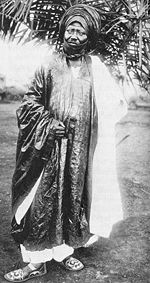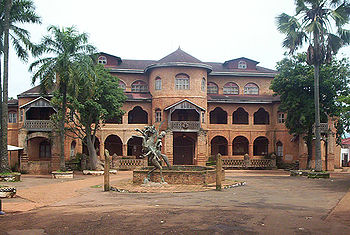
Ibrahim Njoya
Encyclopedia

Dynasty
A dynasty is a sequence of rulers considered members of the same family. Historians traditionally consider many sovereign states' history within a framework of successive dynasties, e.g., China, Ancient Egypt and the Persian Empire...
of king
King
- Centers of population :* King, Ontario, CanadaIn USA:* King, Indiana* King, North Carolina* King, Lincoln County, Wisconsin* King, Waupaca County, Wisconsin* King County, Washington- Moving-image works :Television:...
s that ruled over Bamum and its people in western Cameroon
Cameroon
Cameroon, officially the Republic of Cameroon , is a country in west Central Africa. It is bordered by Nigeria to the west; Chad to the northeast; the Central African Republic to the east; and Equatorial Guinea, Gabon, and the Republic of the Congo to the south. Cameroon's coastline lies on the...
dating back to the 14th century. He succeeded his father Nsangu (hn-SAH-hn-goo) and ruled from 1886/7 until his death in 1933. He was succeeded on the throne by his son, Seidou Njimoluh Njoya.
Rule
Njoya's mother, Njapdunke, initially acted as regent until he reached majority. His own official rule was further delayed because his father's head was held by an adversary people. By tradition the head or skull of an ancestor is of ceremonial importance to the Bamum. The Germans would aid him in recovering the head and this, along with their allowing him relative independence, caused him to have generally good relations with them. Although an additional factor seems to have been a belief that fighting the Germans would prove counterproductive to his people. Hence he rejected the resistance proposals of Rudolf Duala Manga BellRudolf Duala Manga Bell
Rudolf Duala Manga Bell was a Duala king and resistance leader in the German colony of Kamerun. After being educated in both Kamerun and Europe, he succeeded his father, Manga Ndumbe Bell, on 2 September 1908. Manga Bell styled himself after European rulers, and he generally supported the colonial...
.
He also initially tried to adapt Western, and particularly German, ways to his society. In one experiment the uniforms of his soldiers were influenced by an idealized version of those worn by the Hussar
Hussar
Hussar refers to a number of types of light cavalry which originated in Hungary in the 14th century, tracing its roots from Serbian medieval cavalry tradition, brought to Hungary in the course of the Serb migrations, which began in the late 14th century....
s. This experiment met with disfavor from Germans who either felt mocked or intimidated by Africans trained and dressed in a German-influenced manner. He also studied Christianity for a time, possibly converting to it and also to Islam at a different point. After this he ultimately created his own religion that mixed Christianity, Islam, and Bamum traditional religion.
Later his relations with the French would prove more negative and he died in exile in Yaounde
Yaoundé
-Transportation:Yaoundé Nsimalen International Airport is a major civilian hub, while nearby Yaoundé Airport is used by the military. Railway lines run west to the port city of Douala and north to N'Gaoundéré. Many bus companies operate from the city; particularly in the Nsam and Mvan neighborhoods...
.
Innovations
Ibrahim Njoya is credited with developing the Bamum scriptBamum script
The Bamum scripts are an evolutionary series of six scripts created for the Bamum language by King Njoya of Cameroon at the turn of the 20th century...
, a syllabic
Syllabic
Syllabic may refer to:*Canadian Aboriginal syllabics, a family of abugidas used to write a number of Aboriginal Canadian languages.*Syllabary, writing system using symbols for syllables...
system for writing in the Bamum language
Bamum language
Bamum , or in its French spelling Bamoun, is one of the Benue–Congo languages of Cameroon, with approximately a quarter million speakers. The language is well-known for its original script developed by King Njoya and his palace circle around 1895...
. Prior to his reign at the end of the 19th century, the long history of the Bamum people was preserved primarily through oral transmission from one generation to the next in the manner of the African Griot
Griot
A griot or jeli is a West African storyteller. The griot delivers history as a poet, praise singer, and wandering musician. The griot is a repository of oral tradition. As such, they are sometimes also called bards...
tradition. This was largely true of many other African civilizations of the time. Recognizing the inherent danger of important historical facts being omitted or corrupted, he set out to establish a means of written recording of Bamum history. When his work was completed, his alphabet, called, A-ka-u-ku, contained 73 signs.
Njoya is also credited with having invented a hand-powered mill for grinding corn.

Sultan
Sultan is a title with several historical meanings. Originally, it was an Arabic language abstract noun meaning "strength", "authority", "rulership", and "dictatorship", derived from the masdar سلطة , meaning "authority" or "power". Later, it came to be used as the title of certain rulers who...
in Cameroon and the latest ruler in the Bamoun Dynasty, has established a school in the palace built by his grandfather, in which schoolchildren are once again learning the Bamum script developed by Ibrahim Njoya.
Additional reading
A King of Great Accomplishments, Awake!Awake!
Awake! is a monthly illustrated magazine published by Jehovah's Witnesses via the Watch Tower Bible and Tract Society of Pennsylvania and printed in various branch offices around the world. It is considered to be a companion magazine of The Watchtower, and is distributed by Jehovah's Witnesses in...
magazine, December, 2007, pp. 26–27.

